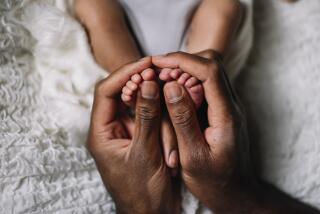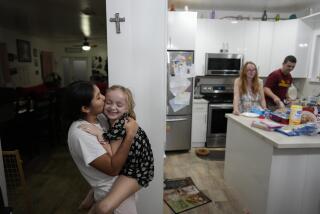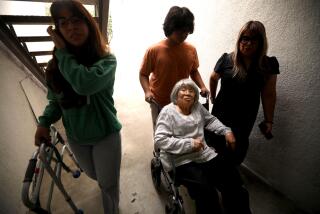Injured Afghan girl finds a second home in U.S.
MOORESVILLE, N.C. — The dark-haired girl wearing an “American Girl” T-shirt blended in with the other giggling girls flopped on their bellies and watching cartoons inside a darkened classroom.
All that distinguished 11-year-old Farida was an eye patch she had decorated with purple glitter and a fancy “F” to cover her missing left eye. Four years ago, in Farida’s remote village in southern Afghanistan, shrapnel from a buried Taliban bomb tore through the eye as she played outside her mud-walled home.
That explosion killed two of Farida’s brothers and a sister, and wounded her mother. The vision in Farida’s left eye is forever gone, but a new world has opened for her here in the lush Carolina Piedmont, where she has had several eye surgeries and has fallen in love with a second family.
After visits here three consecutive summers, Farida acts and sounds as American as her two host sisters, Hannah, 12, and Macy, 7, who shared their home with her this summer. Farida speaks nearly flawless English, laced with coded kids’ jargon familiar to any American parent. She calls her host parents, Asheli and Eric Thompson, “Mommy” and “Daddy.”
Seven thousand miles away, her Afghan family anxiously awaits the latest return of a girl who until four years ago had never left her home district. In a decisive act of courage, Farida’s father, Abdul Rauf, defied the Taliban and permitted his daughter to leave home with an American charity that provides U.S. medical care for injured Afghan children.
The Taliban dominates the family’s province, intimidating locals and killing those who side with the government in Kabul or who work for U.S. forces. Insurgents run shadow courts, cutting off hands, gouging out eyes or stoning to death those who violate their dictates.
Abdul Rauf, 47, is a farmer, a thin, wizened man with a flowing silver beard and calloused hands. After his daughter was wounded in 2009, a neighbor told him about Solace for the Children, a North Carolina-based charity that had helped another injured village child.
Rauf was faced with a wrenching decision — placate the Taliban and condemn Farida to a life of poverty and deprivation, or allow her to leave home in the care of the hated American infidels.
“Some people were saying if the Taliban finds out, they’ll cut off your head,” Rauf said in December in Kabul, where he was reunited with Farida after the girl’s second summer in the U.S.
“I asked these people: Are you afraid to have your own children treated? Will you sacrifice your own flesh and blood?” he said, wrapping Farida in a hug. “I told them: Something good is happening here. Don’t be afraid.”
Sandy Tabor-Gray, a Solace coordinator from Mooresville who accompanied Farida to Kabul, fought back tears as she listened to Rauf in the charity’s Kabul shelter that day.
“He’s risking everything for his daughter,” she said. “I’m in awe of this family’s courage.”
Farida is too young to fully comprehend the cultural and religious chasm between rural Afghanistan and middle-class America. But being thrust into a new world at a tender age has reshaped and molded the girl from the Afghan village. She has embraced life in America. She wants to go to school and make her own choices, supported by her father.
“This little girl is blessed beyond belief to have a father who wants her to have everything possible,” Asheli Thompson said.
Since March, Farida has lived with the Thompsons in Mooresville, outside Charlotte. She’s the second injured Afghan girl the family has taken in. Three summers ago, they hosted Sahar, then 7, who had lost an eye and had part of her face destroyed in a Taliban acid attack.
The Thompsons considered Sahar their daughter, and they have come to think the same of Farida.
A trip to Disney World tops Farida’s list of favorite things about America, just ahead of McDonald’s and the Atlantic Ocean. Over the Fourth of July weekend, she accompanied the family to Myrtle Beach, S.C., and saw an ocean for the first time.
Farida wears glasses to correct the vision in her right eye. Her left eye socket had been fitted with a conformer shell, a clear plastic lens designed to allow her eyelid to blink without rubbing the suture line from surgeries. But the socket closed over the device, and Farida will need further treatment.
She wears her purple eye patch most days. When around her host family, Farida is comfortable enough to remove it and leave the socket exposed beneath her glasses.
Her legs and abdomen are laced with rough, weathered scars from the explosive that detonated as she and her siblings played in a dirt courtyard. She says she remembers the accident clearly — the blast that killed her brother after he stepped on the device, and the piercing screams of her mother, who was peppered with shrapnel as she saw three of her children die.
“She wants me to bring her back some medicine. She still hurts,” Farida said.
Farida has spoken just once with her family since March, on a call her American family managed to place to her father’s cellphone in southern Afghanistan. (The charity asked that Farida’s surname and province not be published for fear of Taliban retaliation.)
Farida worries that she’s forgetting her native Pashto language after months away. At her North Carolina public school, where her teacher says students compete to sit beside Farida, she delivered a talk about Afghanistan to a sixth-grade class.
“I was really nervous,” she said. “But it went OK, and I wrote down all of their names in Pashto for them.”
Last week, the day arrived that Farida and the family had been dreading. It was time to drive her to the airport for her flight to Kabul, accompanied by several other injured Afghan children treated by Solace.
Farida was in tears at the airport, and so were her host sisters and parents. She had spent the morning tearfully saying goodbye to her bedroom, the neighbors, and the family hamster and dog.
“She told me she wanted to stay with us a million days,” Eric Thompson said.
In Kabul, Farida’s father knows that his daughter’s life has been forever altered — not just her physical recovery, but her future as an independent young woman. The father of 11 children, Rauf does not want Farida married off to a relative or older man at age 12 or 14, the custom for many Pashtun girls in rural southern Afghanistan. Farida is scheduled to live at a Solace refuge in Kabul, and attend school nearby.
“Everything is different now for her. She will go to school. She’ll be an educated woman,” Rauf said. “I believe in my heart it’s things like this that will bring peace to our country.”
More to Read
Sign up for Essential California
The most important California stories and recommendations in your inbox every morning.
You may occasionally receive promotional content from the Los Angeles Times.






